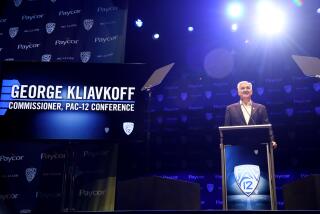SMALLER PARTNER : Hooking Up With SBC a Good Call for Weakened Pacific Telesis
- Share via
When AT&T; Corp. got busted up into a bevy of Baby Bell regional operating companies in 1984, Pacific Telesis Group was the runt of the litter. Not many years later, thanks to a robust state economy and aggressive moves into the unproven but promising field of cellular communications, the company was looking much more muscular.
But two years ago, the cellular operation was split off into a separate entity. California by then had endured several years of recession, with a resulting crimp on the phone company’s growth. And now Pacific Telesis’ chief Pacific Bell unit faces fierce competition in its most basic telephone markets. With the notable exception of technology to provide Internet access, the company is hardly viewed as best of breed on any score, and it has paid the price for that in a lagging stock price that has reflected shareholders’ dissatisfaction.
Indeed, Pacific Telesis’ stock price ultimately got a boost not from any savvy management decisions on nuts-and-bolts operations, but from a financial maneuver--Pacific Telesis’ agreement to be taken over by SBC Communications Inc., in a $16.7-billion deal announced Monday. The fact that the merged company will take SBC’s name--and SBC’s chairman will run the company--is further evidence of Pacific Telesis’ weaker position.
“Pacific Bell was always considered inferior when it was with AT&T;,” said Bill Davidson, a USC business professor and a telecommunications industry consultant. Even now, he said, “you’d be hard-pressed to find an area where Pac Bell was considered top of the heap.”
Indeed, Pacific Telesis management got decidedly mixed reviews Monday as industry analysts and consultants assessed the company’s history since the Jan. 1, 1984, breakup of AT&T.; Like the proverbial blind men describing the elephant, they described the company alternately as aggressive and cautious, prescient and lacking in vision.
“Management there is not as deep or strong as at other” Bell operating companies, said Ross Brown, managing partner with Egon Zehnder International, an executive search firm, and former chief executive of Pacific Telesis’ international operations.
On the contrary, said Bryan Van Dussen, director of telecommunications research at Yankee Group Inc. in Boston. “The company has followed a very aggressive approach to new markets,” he said.
With 49,000 employees, down from a phone company peak of 114,000 in 1981, San Francisco-based Pacific Telesis Group owns Pacific Bell, serving about 75% of California’s 31 million residents, and Nevada Bell, which serves about one-third of that state’s 2 million population. Combined, the units provide nearly 15.8 million “access lines” for customers.
Pacific Bell Directory, another unit, prints 35 million directories a year.
On the regulatory front, Pacific Telesis has had a checkered history. For many years, Davidson said, California was one of the most stringent regulatory environments in the country. In the late 1980s, for example, the state Public Utilities Commission prohibited Pacific Bell from trying to recoup, in the form of higher rates for customers, several hundred million dollars in investments for digital switching technology. For a time, as a result, Pacific Bell fell behind in much needed technological advances.
But the tide had turned by the early 1990s, when Gov. Pete Wilson advocated a swift move into unfettered competition in all telecommunications markets--in line with the mood then sweeping Washington as well.
With unaccustomed speed, the PUC was voting to open telephone markets to rivals. Even there, Pacific Bell and would-be rivals encountered many bumps along the road.
In an embarrassing action, the PUC in late 1993 rescinded a groundbreaking order overhauling local telephone rates amid allegations that a Pacific Bell employee helped draft it. That put on hold a revolutionary change that would have allowed long-distance companies and others to compete with Pacific Bell on so-called local long-distance, or toll, calls.
About a year later, that change finally went through. Pacific Bell’s revenue suffered enormously as a result of the competition, even though the PUC allowed the company to dramatically raise its rates on basic phone service. In the last quarter of 1995, for example, toll-call revenue tumbled about 40% from the same period the year before--creating what Van Dussen of Yankee Group called “a financial straitjacket.”
Opinion was also divided on whether Pacific Telesis erred in spinning off its cellular operations into a separate company called Air Touch Communications. For one thing, Pacific Telesis’ entrepreneurial CEO, Sam Ginn, left for Air Touch. And for another, the split robbed Pacific Telesis of revenue in a hot market.
“If they’d left things alone, maybe they wouldn’t have needed to do this deal,” said Steven Colton, manager of the Benham Utilities Income stock mutual fund in Mountain View, Calif.
On the other hand, the spinoff removed some regulatory restraints and enabled Pacific Bell to go after contracts for “personal communications services,” potentially lucrative wireless services that helped attract SBC. But Pacific Bell’s hefty outlay for those contracts has also made the company more vulnerable.
Over the years, Pacific Telesis has also had a mixed relationship with its customers. In 1986, the company was socked with an order to refund millions of dollars to customers after an investigation found that Pacific Bell was using high-pressure sales tactics to sell consumers a package of services without explaining their cost or the availability of low-cost Lifeline services.
Most recently, the company lost years of potentially lucrative business on “caller ID” after it remained insensitive to some watchdog groups’ concerns that the service would violate privacy. Pacific Bell is just now beginning to offer the service in California, one of the last states to feature it.
Times staff writer Tom Petruno contributed to this story.
More to Read
Inside the business of entertainment
The Wide Shot brings you news, analysis and insights on everything from streaming wars to production — and what it all means for the future.
You may occasionally receive promotional content from the Los Angeles Times.









